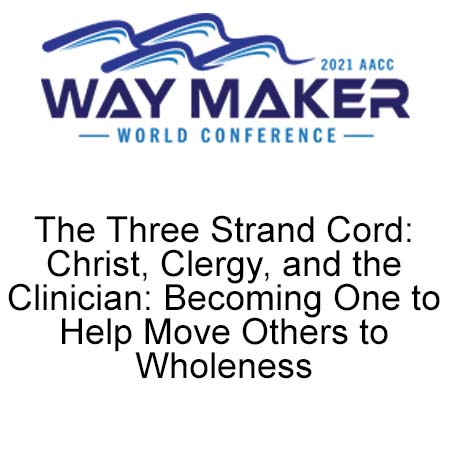Description
605: The Three Strand Cord: Christ, Clergy, and the Clinician: Becoming One to Help Move Others to Wholeness
Nathaniel Isaac, Psy.D.
Labourers for Christ Center for Reconstruction
P.O. Box 6561
Williamsburg, VA 23188
Summary
The separation of faith from psychology due to the need for empirical data is now heavily reflected within the institutions of education and the Church, thus, establishing barriers between the two disciplines. This barrier continues to create an imbalance between clergy and clinicians and their respective practices in how they bring people to wholeness. For clergy, despite the awareness of mental illness in the Church, they often establish themselves as a resource or referral center for individuals in mental distress, limiting the level of care necessary in bringing them into wholeness. On the other hand, clinicians are equipped to deal with severe, chronic cases of mental illness but struggle to integrate faith or help people develop their sense of faith and dependency on God. Both are called to deal with cognitive distortion within the scope of their respective disciplines but have yet to figure how to bridge their disciplines to function interdependently. Consequently, restrictions are placed upon both clergy and clinicians that produce boundaries or a “stay in your lane” mentality that hinders Christ’s work and the Holy Spirit’s ability to operate fully and collectively through both disciplines in the treatment of mental illness or counseling. A solution then is to remove any notion that Christ, through the power of the Holy Spirit, is not operable through clergy or the clinician when handling individuals’ mental illness or need for counseling. Collectively, both clergy and clinician should explore Christ’s definition of the Spirit of Counsel and develop a spiritual, biblical, and pragmatic model. The exploration of this definition will allow all parties to transcend beyond their current perception of their ability to assist others and, more importantly, move into deeper realms of problem-solving, purposeful discoveries, and ownership of an embedding solution that allows us to successfully navigate through life confidently with Christ.
Learning Objectives
Participants will:
• Identify the challenges of incorporating faith into practice for individuals who do and do not desire biblical/faith-based counseling to move toward faith and a dependency on God
• Develop a model that helps licensed mental health professionals to harmoniously merge their respective disciplines and practices of faith to point individuals toward understanding what roles faith has in giving their paths direction and purpose
• Critique and redefine the term “counseling” so it may incorporate and align itself with the biblical definition of the “Spirit of counsel” to be used as an evangelistic tool to help others continue to seek direction and instruction from God concerning life and daily living





